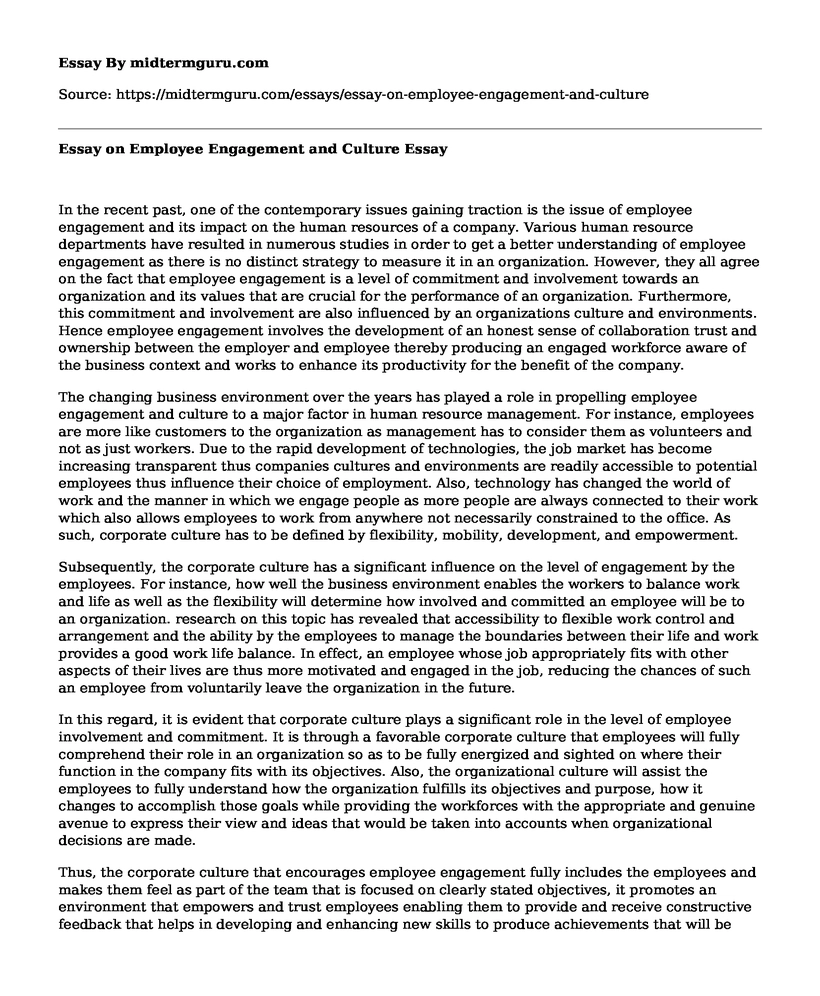In the recent past, one of the contemporary issues gaining traction is the issue of employee engagement and its impact on the human resources of a company. Various human resource departments have resulted in numerous studies in order to get a better understanding of employee engagement as there is no distinct strategy to measure it in an organization. However, they all agree on the fact that employee engagement is a level of commitment and involvement towards an organization and its values that are crucial for the performance of an organization. Furthermore, this commitment and involvement are also influenced by an organizations culture and environments. Hence employee engagement involves the development of an honest sense of collaboration trust and ownership between the employer and employee thereby producing an engaged workforce aware of the business context and works to enhance its productivity for the benefit of the company.
The changing business environment over the years has played a role in propelling employee engagement and culture to a major factor in human resource management. For instance, employees are more like customers to the organization as management has to consider them as volunteers and not as just workers. Due to the rapid development of technologies, the job market has become increasing transparent thus companies cultures and environments are readily accessible to potential employees thus influence their choice of employment. Also, technology has changed the world of work and the manner in which we engage people as more people are always connected to their work which also allows employees to work from anywhere not necessarily constrained to the office. As such, corporate culture has to be defined by flexibility, mobility, development, and empowerment.
Subsequently, the corporate culture has a significant influence on the level of engagement by the employees. For instance, how well the business environment enables the workers to balance work and life as well as the flexibility will determine how involved and committed an employee will be to an organization. research on this topic has revealed that accessibility to flexible work control and arrangement and the ability by the employees to manage the boundaries between their life and work provides a good work life balance. In effect, an employee whose job appropriately fits with other aspects of their lives are thus more motivated and engaged in the job, reducing the chances of such an employee from voluntarily leave the organization in the future.
In this regard, it is evident that corporate culture plays a significant role in the level of employee involvement and commitment. It is through a favorable corporate culture that employees will fully comprehend their role in an organization so as to be fully energized and sighted on where their function in the company fits with its objectives. Also, the organizational culture will assist the employees to fully understand how the organization fulfills its objectives and purpose, how it changes to accomplish those goals while providing the workforces with the appropriate and genuine avenue to express their view and ideas that would be taken into accounts when organizational decisions are made.
Thus, the corporate culture that encourages employee engagement fully includes the employees and makes them feel as part of the team that is focused on clearly stated objectives, it promotes an environment that empowers and trust employees enabling them to provide and receive constructive feedback that helps in developing and enhancing new skills to produce achievements that will be fully recognized by the organization. Overall a fully engaged workforce has authentic and firm values, promoted by the corporate culture, that enable fairness and trust because of the mutual respect between the employees and the employer.
Employee engagement and culture are ultimately a product of organizational leadership. Subsequently the major driver for employee engagement is organizational culture as the employees are expected to work together and cooperate thus take charge and provide a medium for the customers within the business. An organization has to implement a cooperative culture so as to fulfill the need to reach consensus towards a common goal as favorable culture promoting healthy cooperation provide the ability to come up with multiple options from the workforce that can then all be considered to develop an optimal option. In a situation where a company has access to various strategies and opinions from the workforce that are aimed at developing optimal strategies for the market and the customers, it provides an advantage for organization the employees and the customers which can also lead to a competitive edge for the organization.
Furthermore, an organization with a motivated workforce to achieve the company objectives has a customer base that is more willing to continually use their products which lead to a higher customer satisfaction level. As such, it is an organization's human resources that impact customer behavior and customer attitudes. Therefore, employee engagement and culture not only impacts a companys human resources but it also has an impact on a companys profitability as a highly motivated, committed and involved workforce affects how the organization interacts with the clients and the market.
Cite this page
Essay on Employee Engagement and Culture. (2021, Jul 02). Retrieved from https://midtermguru.com/essays/essay-on-employee-engagement-and-culture
If you are the original author of this essay and no longer wish to have it published on the midtermguru.com website, please click below to request its removal:
- Servant Leadership in Nursing Team
- Essay Sample on Leadership Skills of Winston Churchill
- Strategic Urbanization of Information Systems and Planning - Research Paper
- Organizational Ethics: Key Considerations for Decision Making - Essay Sample
- Improvement Goals: Achieving Sustainable Growth & Performance - Research Paper
- Unlock Your Potential With Work-Integrated Learning (WIL) - Essay Sample
- Alpha Phi Alpha: Pioneers of African-American Fraternity & Leadership - Essay Sample







